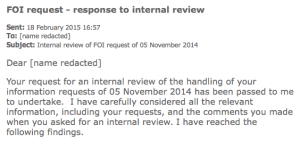FOIMan highlights the difficulty of handling FOI requests at the height of industrial disputes.

Those responsible for managing FOI compliance are in a difficult position at the best of times. I’m sure they wouldn’t quote Stealers Wheel to describe their situation (“clowns to the left of me, jokers to the right”) but nonetheless they are stuck in the middle of two camps, each of which passionately feels it is right. On the one side there is the requester seeking transparency and accountability, for whom often any reticence to disclose is another example of establishment secrecy. On the other, there is the information holder, often more senior than the one responsible for compliance, who sees their job as being to protect the organisation from harm. They know the information and its context much better than the FOI Officer and the poor old FOI Officer therefore has to judge whether their reluctance to disclose is justified by the facts, or whether the information holder is being unnecessarily defensive. Things can be even more complicated if those responsible for answering the request are directly affected by the matter concerned.
Pity then those responsible for answering FOI requests at the Information Commissioner’s Office (ICO). As correspondence disclosed by a member of the PCS union and published over the weekend by FOI Kid (no relation) shows, they are in a very tricky place at present. PCS are taking industrial action over a recent decision to award three senior officials large pay rises, whilst other staff have seen very limited pay increases, in line with the rest of the public sector. Union officials made FOI requests to their employer in order to understand the reasons behind the pay awards. Initially told that information was not held, the ICO appears to have changed its mind at internal review.
Dealing with requests in these circumstances is never easy, and any organisation can be forgiven for making mistakes under pressure. That even the regulator’s handling of such a case appears somewhat clunky demonstrates how difficult it can be when employee relations meet FOI.


Hi Paul – I think what this omits is the fact that the person who said “no information held” at first and second instances, was the Information Commissioner himself, and, given the context of the request, it seems pretty odd that he would not have at least performed his section 16 duty to try to establish what exactly was being requested.
I also think it is fair to hold the ICO to a higher standard, and criticise them when they fall below it. I’m not sure I’m so forgiving…
I suspect the reason the PCS asked CG directly is because it wasnt intended as an FOI request. This is supported by the fact they complained about the reply instead of requesting an Internal Review. I’m sure the PCS regularly ask for information that is provided to them in their specific capacity and wouldn’t be furnished under FOI. Of course it is still technically an FOI request but I think a little context can be applied.
If the Information Commissioner is reduced to quibbling over what is, or is not, ‘technically’ an FOI request, they will have to be a lot of forgiving when dealing with other public authorities that make the same mistake. A written request for recorded information is an FOI request. It’s not a complex issue.
Hi Andy – the table in the attachment on FOIKid’s blog refers to a “request for information” being sent on 5 November. If anyone should recognise that a “request for information” should be dealt with under a public authority’s obligations under section 1(1) FOIA, surely it should be the regulator of the Act?
Hi Jon – not sure I agree a request for information should (always) be dealt with in accordance with FOI.
From experience, a Union will often have a direct line to Senior Management and request information in their capacity as a recognised Union.
My assumption from the information published is that the request wasn’t made or initially intended as an FOI request. I find that significant when assessing the initial response.
Of course, if one doesn’t receive a satisfactory reply outside of FOI then the PA needs to be mindful of their FOI obligations (incidentally I take the same view of Twitter requests). I therefore agree some criticism is warranted. But equally doesn’t the wider context of industrial relations muddy the waters a little?
Anyway, that was my take on the affair and indeed Paul’s piece.
Hi Jon
My intention here was to flag the dispute up and make a general point that FOI brings a new dimension to industrial disputes. I deliberately chose not to offer any analysis of the rights and wrongs of the case as, well… there are other blogs that do that, aren’t there? 😉 Look forward to reading your analysis.
I guess it was the implication that they could be forgiven for making a mistake that I was specifically replying to.
I’m not sure I’m in a position to blog on this until there’s more information available.